7 'Healthy' Foods That Are Actually Worse for You Than Candy, Say Dietitians
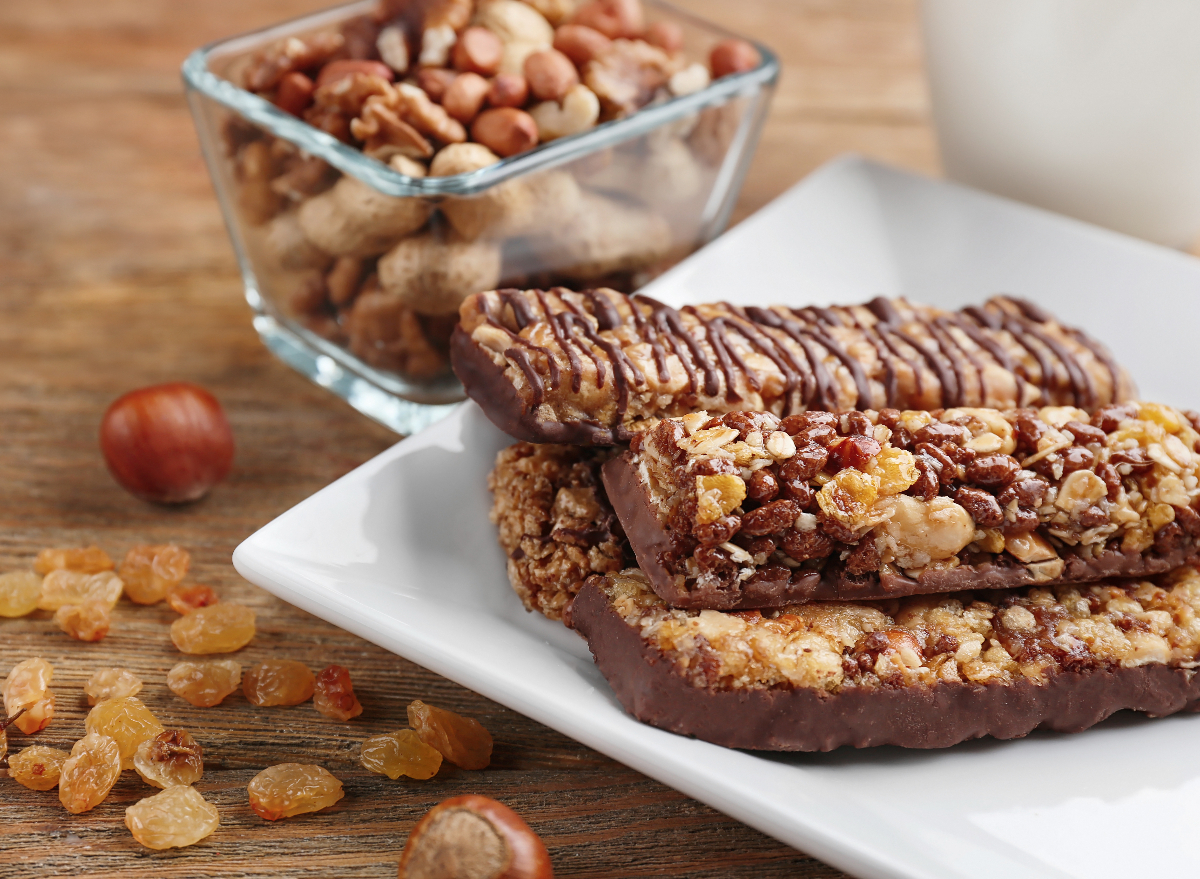
It feels like a million different types of food get marketed as "healthy" nowadays. Many of these items have tangible lifestyle benefits and come packed with vitamins, minerals, and other positive nutrients that make a huge difference in your diet. Other foods find ways to cut down on calories, salt, sugar, and fat, offering up a more wholesome alternative to traditional versions. You might never guess that some of these foods marketed as "healthy" are actually worse for you than candy.
To figure out which foods do less nutritional good for our bodies than candy, it's important to understand why candy is bad for you in the first place.
"Eating candy is generally considered unhealthy because it is high in sugar and calories and typically does not provide much nutritional value," says Trista Best, MPH, RD, LD, at Balance One Supplements. "Consuming too much sugar can lead to a range of health problems, including weight gain, tooth decay, and an increased risk of certain chronic diseases, such as type 2 diabetes and heart disease."
"Candy is often classified as an 'empty calorie' food—meaning it provides energy (aka calories), but little in the way of essential nutrients like vitamins, minerals, and fiber," continues Best. "It is important to have a well-balanced diet that includes a variety of healthy foods and limits the intake of high-sugar foods like candy."
Eat This Not That! consulted a handful of additional experts to determine which foods that are typically marketed as "healthy" may actually do more damage than you realize. In some cases, these selections prove worse for your health than candy because of how much sugar they contain. Others manage to go beyond simple empty calories or excess sugars by including added fast or salts that you might not see in a generic chocolate bar or lollipop.
With all of this in mind, here are seven "healthy" foods that dietitians say can be worse for your health than candy—and for more healthy eating tips to help you make better eating decisions, be sure to check out The Best Sweeteners for Your Blood Sugar—Ranked!
Dried fruit
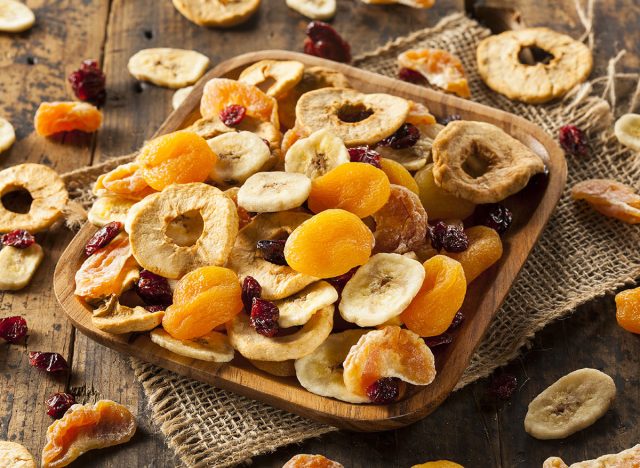
You might never have considered that fruit could be worse for you than candy. However, dried fruit presents a variety of problems, especially when compared to something like a hard fruit candy.
"While fruit is generally considered a healthy food, dried fruit is often high in sugar and calories. It is also typically smaller in size, making it easy to eat more than you would of fresh fruit, which can contribute to weight gain," explains Best. "Rather than turning to dried fruit in a pinch, opt for whole fruit that is just as convenient as dried fruit, like apples, bananas, and [raisins]."
Don't feel like you need to completely ditch dried fruit. It actually ranks as one of the 7 Surprising Foods You Don't Have To Give Up To Lose Weight, Says Dietitian—just make sure to eat it in moderation.
Granola
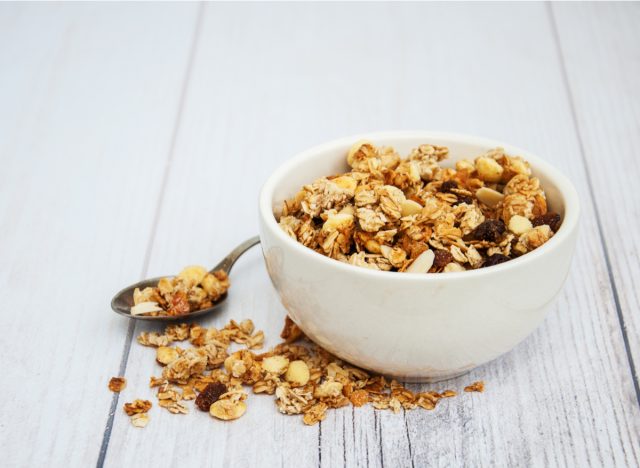
When you think of healthy grains, granola likely springs to mind. While many companies want you to think of this food as a wholesome alternative to other sugary breakfast cereal, many types of granola use various oils to bind the grains together that then gets sweetened with sugar.
"Granola is often marketed as a healthy option, but it can be high in sugar and unhealthy fats," says Best. "It is important to read the label and choose granola that is lower in sugar [that is also] made with whole grains and healthy fats."
Energy bars

Energy bars have found a niche among health-minded folks, partially thanks to their advertising campaigns featuring images of rockclimbers and athletes. While many believe that fit lifestyles and energy bars go hand in hand, this food has a dark nutritional underbelly. When you turn the bar over and read the nutrition information, you might be shocked to see incredibly high percentages of carbs and fat.
"Energy bars are often marketed as a healthy, convenient snack, but many varieties are high in sugar and calories," explains Best. "It is important to choose energy bars that are made with whole grains and have a lower sugar content."
Not every energy bar has nutrition stats worse than a chocolate bar. Knowing about The Best & Worst Energy Bars—Ranked can help you make an informed purchasing decision next time you hit the grocery store.
Cereal bars
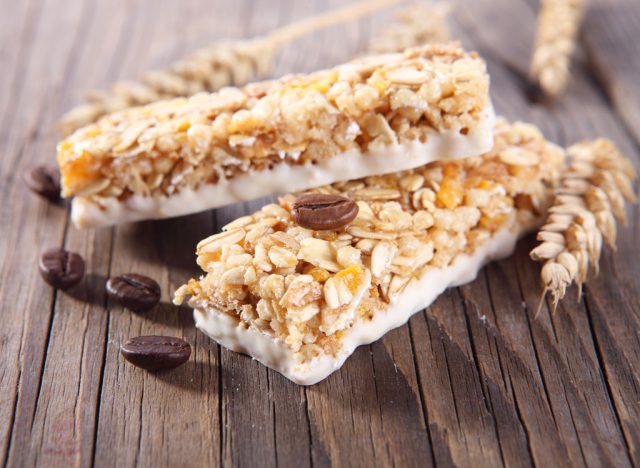
Cereal gets a bad nutritional rap for good reason—many versions of this breakfast staple come packed with sugar. While certain whole grain cereals might not inflict the same kind of nutritional damage, you probably don't see them in cereal bar form. Marketed as healthy on-the-go breakfasts, some of the leading cereals have found their way into individually-packaged bar form. While the marketing for these cereal bars look pretty healthy, don't be fooled.
"Many of them contain more sugar than a candy bar and often [have] just as little fiber," says Yelena Wheeler MPH, RDN, a registered dietitian nutritionist for MIDSS.
Frozen yogurt
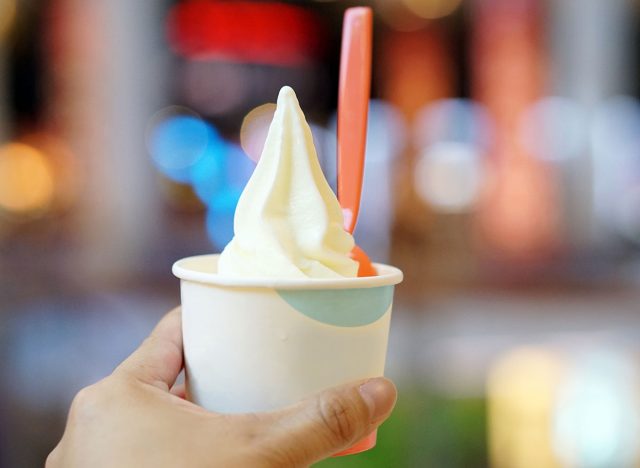
If you had to serve up a healthy dessert and had to pick between candy and frozen yogurt, the frozen yogurt seems like the obvious choice. The marketing surrounding this confection makes it seem like a healthy dessert alternative, despite the hearty amount of sugar and fat found in each serving.
"Many varieties [of frozen yogurt] contain lots of sugar—often more than candy and regular [ice] cream," says Lisa R. Young, Ph.D., RDN, author of Finally Full, Finally Slim and a member of our Medical Expert Board. "And because people think they are 'yogurt,' they often eat a bigger portion."
All of the sugar in this treat ends up creating health problems down the road. In fact, frozen yogurt even ranks as one of the 6 Snacks Secretly Increasing Inflammation In Your Body, Say Dietitians.
Canned soup
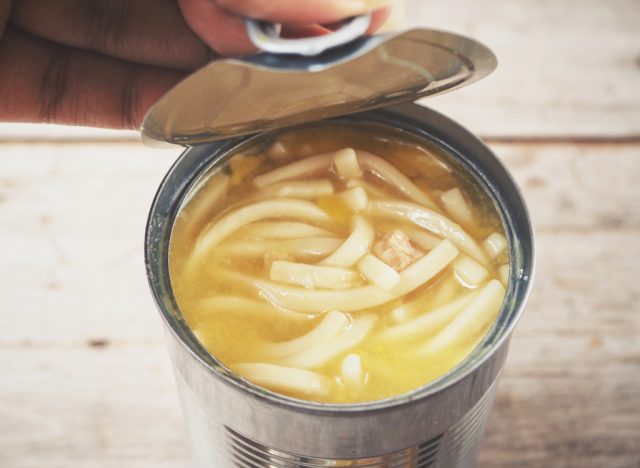
Many types of "healthy" canned soups have sprung up over the years, but not every brand has lived up to these marketed expectations.
"Because of the extremely high sodium content, little to no protein or fiber, and many times high sugar content, coupled with the can that can be lined with BPA, [which is] known to increase the risk of obesity and insulin resistance," says Bridget MacDonald, RDN, a registered dietitian at Welcyon. "You would be much better off having a small handful of [chocolate candies] with almonds."
Low-fat salad dressing

Salad rarely gets mentioned in the same breath as candy, especially when talking about positive nutrition. What goes on top of a salad makes a world of difference, but unfortunately, many low-fat salad dressings make up the taste difference with high sugar and low-quality fat.
"Typically the main ingredient is vegetable oil," says MacDonald. "These contain high amounts of omega 6 fatty acids which can lead to chronic inflammation in the body. They almost always contain copious amounts of sugar. A fun-size Milky Way will have less sugar […] and while it does contain oil, it's in a much smaller quantity."
Must you forever avoid all these of these 'health' foods that are actually unhealthy?

If you're wondering if all of this means that you can never enjoy eating these foods again in order to live a healthy lifestyle—think again. That is not the case. When it comes to understanding how to make the smartest, healthiest choices for your diet, Best reminds us of what matters most in the grand scheme of things.
"It's important to remember that no single food is 'healthy' or 'unhealthy' in isolation," she says. "It's the overall balance of your diet that matters most.
"It is OK to enjoy these types of foods occasionally, but they should not be a regular part of your diet," Best adds. "Instead, try to incorporate a variety of nutrient-dense foods, such as fruits, vegetables, whole grains, and lean proteins, into your meals and snacks."









